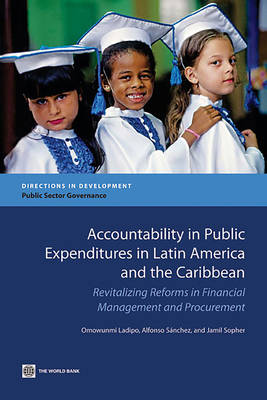
Bedankt voor het vertrouwen het afgelopen jaar! Om jou te bedanken bieden we GRATIS verzending (in België) aan op alles gedurende de hele maand januari.
- Afhalen na 1 uur in een winkel met voorraad
- In januari gratis thuislevering in België
- Ruim aanbod met 7 miljoen producten
Bedankt voor het vertrouwen het afgelopen jaar! Om jou te bedanken bieden we GRATIS verzending (in België) aan op alles gedurende de hele maand januari.
- Afhalen na 1 uur in een winkel met voorraad
- In januari gratis thuislevering in België
- Ruim aanbod met 7 miljoen producten
Zoeken
Accountability in Public Expenditures in Latin America and the Caribbean
Revitalizing Reforms in Financial Management and Procurement
Omowunmi Ladipo, Alfonso Sánchez, Jamil Sopher
€ 42,45
+ 84 punten
Omschrijving
Fiscal discipline and public sector efficiency became prominent issues in Latin America and the Caribbean in the late 1980's following external debt crises that troubled many countries in the region. Resolution of the debt crises necessitated a first wave of reforms that largely focused on upgrading legal and regulatory frameworks or improving information systems. Nearly twenty years later progress in matching OECD practices and performance in public financial management and procurement has been uneven and has been one of the factors that impeded higher growth and competitiveness in Latin America and the Caribbean. Countries such as Chile, Brazil and Costa Rica with relatively good performance, in this respect, have shown what other countries in the region can do and how they would benefit. Increased globalization, seemingly intractable issues of income inequality, the onset of the recent global financial crises and the emergence of an assertive middle class that demands better governance, are all reasons why Latin America and the Caribbean governments should closely examine incomplete financial management and procurement reform programs and embark on trajectories that will improve their performance and be better responsive to the needs of their citizens. This book sets out, based on more than a decade of World Bank diagnostics, key areas that remain to be addressed by governments in the Latin America and the Caribbean region to underpin sustainable arrangements that deliver efficient and effective services, which are accountable to citizens. Success will have the important additional benefit of serving to notify international financial markets of the integrity of their stewardship function.
Specificaties
Betrokkenen
- Auteur(s):
- Uitgeverij:
Inhoud
- Aantal bladzijden:
- 128
- Taal:
- Engels
- Reeks:
Eigenschappen
- Productcode (EAN):
- 9780821379844
- Verschijningsdatum:
- 12/06/2009
- Uitvoering:
- Paperback
- Formaat:
- Trade paperback (VS)
- Afmetingen:
- 152 mm x 226 mm
- Gewicht:
- 226 g

Alleen bij Standaard Boekhandel
+ 84 punten op je klantenkaart van Standaard Boekhandel
Beoordelingen
We publiceren alleen reviews die voldoen aan de voorwaarden voor reviews. Bekijk onze voorwaarden voor reviews.









